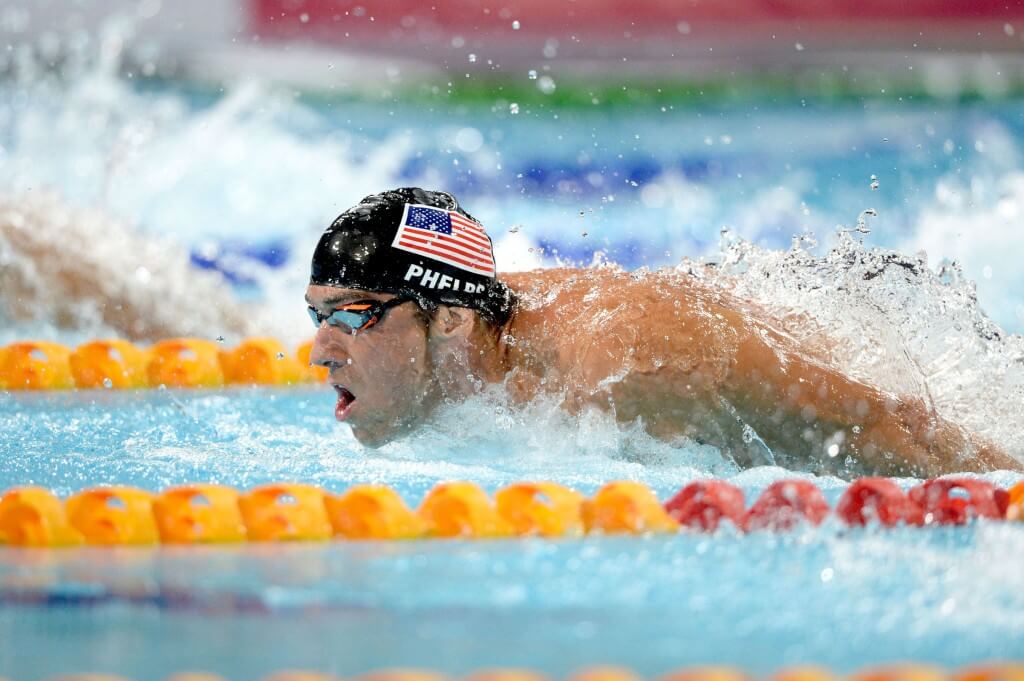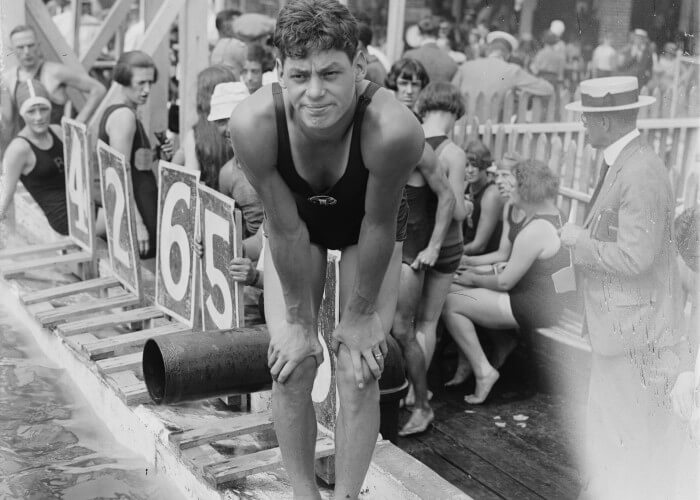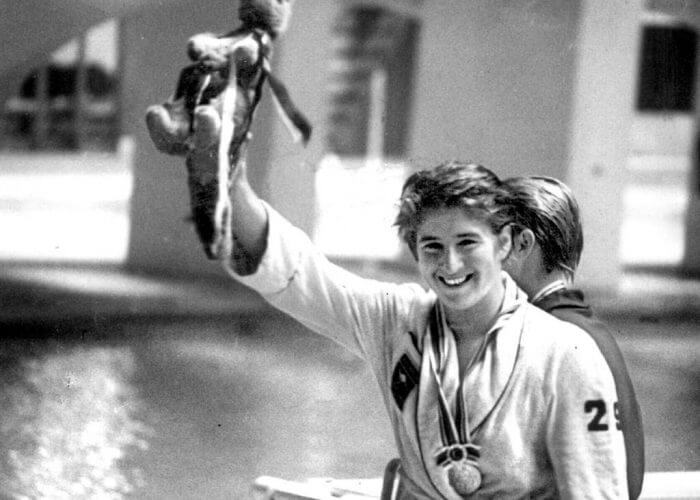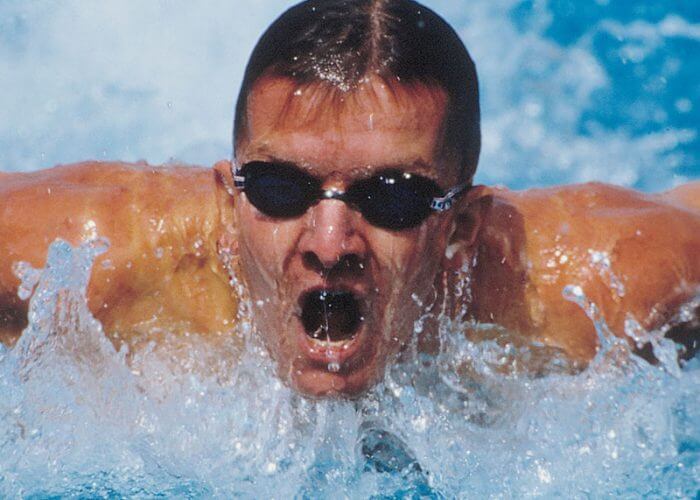Throwback Thursday: Celebrating the Anniversaries of Several Iconic Olympic Swimming Moments

Throwback Thursday: Celebrating the Anniversaries of Several Iconic Olympic Swimming Moments
Regardless of sport, trawls through history allow for the appreciation of great moments and legends who excelled in their field. So, with the next edition of the Olympic Games rapidly approaching in Paris, we’re going to look back and feature the highlights from some of the anniversaries that will be celebrated in 2024. Enjoy this trip through Games of the past.
Click here for a complimentary digital edition of Swimming World Magazine’s January issue.
1904 (120th Anniversary)
Site: St. Louis…Number of Events: 9
- The first Olympiad held in the United States featured only men’s events, with American Charlie Daniels—the United States’ first star in the sport—leading the way with a five-medal haul. Daniels earned titles in the 220 yard freestyle, 440 freestyle and as a member of Team USA’s 200 freestyle relay. He added a silver medal in the 100 freestyle and a bronze medal in the 50 freestyle.
- Hungary boasts a rich tradition in the pool, and it dates back to the days of Zoltan Halmay, who swept the 50 and 100 freestyles in St. Louis. Halmay made his Olympic debut four years earlier at the 1900 Olympics in Paris, where he won three medals. He also raced to a pair of medals at the 1908 Games in London.
1924 (100th Anniversary)
Site: Paris…Number of Events: 11
-

Johnny Weissmuller – Photo Courtesy: ISHOF
A century has passed since Paris served as host of the Olympic Games, and was the site of Johnny Weissmuller’s international emergence. At the 1924 Games, Weissmuller surged to gold medals in the 100 freestyle and 400 freestyle, and anchored the United States to victory in the 800 freestyle relay. Of course, Weissmuller would go on to excel at the 1928 Games, and eventually become a Hollywood star as Tarzan.
- The United States dominated the women’s competition in 1924, claiming gold in four of the five female events. More, American women combined for 10 podium appearances, including gold-silver-bronze sweeps in the 100 freestyle and 400 freestyle.
1964 (60th Anniversary)
Site: Tokyo…Number of Events: 18
-

Dawn Fraser – Photo Courtesy: Dawn Fraser Collection
Australian ace Dawn Fraser made history during the Olympic Games’ first visit to Asia. After winning gold in the 100 freestyle at the 1956 Olympics and 1960 Games, Fraser became the first swimmer to three-peat when she prevailed in 1964. That feat was not matched until 1996, when Hungarian Krisztina Egerszegi won her third straight Olympic title in the 200 backstroke.
- When the topic of greatest American swimmers of all-time is raised, Don Schollander’s name is always part of the conversation. At the Tokyo Games, Schollander secured his place in history by capturing four gold medals, including individual titles in the 100 freestyle and 400 freestyle. Schollander was denied a third solo title in the 200 freestyle only because the event, which was his strongest, was not part of the Olympic program.
- Overshadowed by Fraser’s greatness was American Sharon Stouder, who finished as the silver medalist to the Aussie in the 100 freestyle. Stouder, though, earned three gold medals in her other events, highlighted by a world record in the 100 butterfly. She also helped the United States to triumphs in the 400 medley relay and 400 freestyle relay.
- The gold medal in the men’s 400 individual medley went to American Dick Roth, but not without drama. Ahead of the prelims of the event, Roth was stricken by a bout of appendicitis and taken to a U.S. Army hospital. Prepped for surgery, the 17-year-old Roth begged his parents to let him swim and to delay the procedure to remove his appendix. Given the opportunity to race, and with the help of antibiotics, Roth fought through the pain and delivered a world-record performance of 4:45.4 to capture the gold medal.
1984 (40th Anniversary)
Site: Los Angeles…Number of Events: 29
- The 1984 Games marked the second straight Olympiad in which a major boycott affected the participating nations. After the United States led a boycott of the 1980 Olympics in Moscow, as a protest to the Soviet Union’s invasion of Afghanistan, the Soviet Union led a retaliatory boycott of the 1984 Games by Eastern Bloc countries that also included East Germany, Hungary and Poland.
- The final of the women’s 100 freestyle featured the first tie in Olympic swimming history, as Americans Nancy Hogshead and Carrie Steinseifer produced matching times of 55.92. The opportunity for a deadlock resulted from the final of the men’s 400 individual medley at the 1972 Games in Munich. There, Sweden’s Gunnar Larsson and the United States’ Tim McKee tied to the hundredth of a second, but Larsson was awarded the gold medal when the time was taken to the thousandth of a second. Following that incident, it was determined that ties would be allowed if athletes had matching marks to the hundredth of a second.
-

Michael Gross – Photo Courtesy: Michael Gross (video still)
West Germany’s Michael Gross, nicknamed the Albatross, won three individual medals. Behind world-record performances, Gross stood atop the podium in the 200 freestyle and 100 butterfly. In the 200 fly, where Gross was the world record holder and heavy favorite, the West German captured the silver medal, as 17-year-old Australian Jon Sieben set a world record and delivered the upset of the competition.
- Because the United States boycotted the 1980 Games, many top American athletes waited four years for their chance at Olympic glory. Among those enduring the heartache of four years earlier and capturing gold medals were Tracy Caulkins (200 individual medley/400 individual medley), Mary T. Meagher (100 butterfly/200 butterfly) and Rowdy Gaines (100 freestyle).
2004 (20th Anniversary)
Site: Athens…Number of Events: 32
- After making his debut at the 2000 Games in Sydney as a 15-year-old, Michael Phelps walked away from Athens with the first eight medals of his Olympic career: six gold and two bronze. Phelps captured individual titles in the 100 butterfly, 200 butterfly, 200 individual medley and 400 individual medley. In the years ahead, he added 20 more medals to his collection.
- The men’s 200 freestyle was dubbed “The Race of the Century,” as it matched Aussie Ian Thorpe and the Netherlands’ Pieter van den Hoogenband with Phelps, who was an upstart in the event. Ultimately, Thorpe avenged his defeat to van den Hoogenband from Sydney, with Phelps grabbing the bronze medal.
One of the most underappreciated swimmers of this millennium, Ukraine’s Yana Klochkova doubled in the individual medley events for the second consecutive Games. After sweeping the 200 IM and 400 IM in Sydney, Klochkova repeated that feat by edging Americans Amanda Beard (200 IM) and Kaitlin Sandeno (400 IM). Beard, who made her Olympic debut as a 14-year-old in 1996, won gold in the 200 breaststroke.
- Controversy erupted after the final of the men’s 100 breaststroke, which was won by Japan’s Kosuke Kitajima over his American rival, Brendan Hansen. Video of the race showed Kitajima using illegal dolphin kicks (banned at the time) off the start and turn en route to a narrow triumph over Hansen. After the race, the United States’ Aaron Peirsol voiced his opinion on the outcome, stating that “Kitajima cheated his way to gold.”



